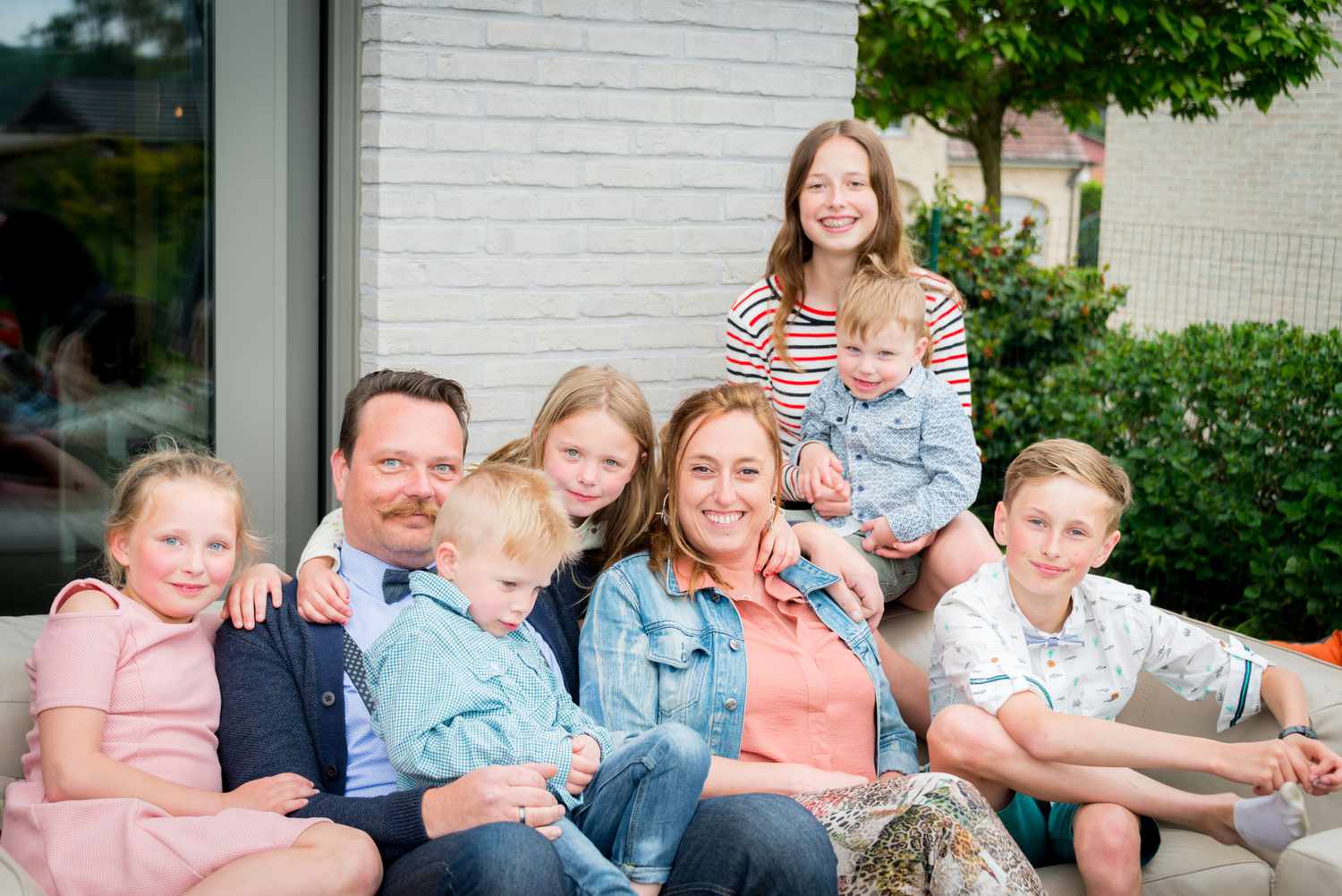Extended family là gia đình mở rộng với sự chung sống của 3 thế hệ trong một ngôi nhà. Với kiểu gia đình này, có những điều gì khác so với gia đình hạt nhân? Bài viết hôm nay, UNI Academy sẽ hướng dẫn bạn talk about extended family một cách chi tiết và rõ ràng nhất, giúp bạn có thể kể về gia đình mình cho những người bạn xung quanh của mình.
Nội dung chính
Từ vựng chủ đề talk about extended family

- Extended family: gia đình mở rộng
- Nuclear family: gia đình hạt nhân
- Multigenerational family: gia đình đa thế hệ
- Relatives: người thân
- Grandparents: ông bà
- Aunts and uncles: dì chú
- Cousins: anh chị em họ
- In-laws: họ hàng của vợ/chồng
- Family values: giá trị gia đình
- Tradition: truyền thống
- Support: hỗ trợ
- Connection: sự kết nối, liên kết
- Bond: mối liên hệ, tình cảm
- Relationship: mối quan hệ
- Heritage: di sản, di tích
- Culture: văn hóa
- Unity: sự đoàn kết, thống nhất.
- Socializing: tương tác xã hội, tham gia các hoạt động, sự kiện, để kết nối với người khác.
- Upbringing: việc nuôi dưỡng, giáo dục và chăm sóc trẻ em.
- Intergenerational living: sống đồng hành giữa các thế hệ, nghĩa là nhiều thế hệ sống chung một nhà.
- Financial support: hỗ trợ tài chính, cung cấp tiền bạc hoặc tài sản để giúp đỡ người khác.
- Cultural heritage: di sản văn hóa, các giá trị, thủ tục, truyền thống được truyền từ một thế hệ sang thế hệ khác.
Các idiom sử dụng trong chủ đề talk about extended family

- Flesh and blood: máu mủ ruột thịt
- Chip off the old block: giống bố mẹ như đúc
- like two peas in the same pot: giống nhau như đúc
- Like father, like son: cha nào, con nấy
- When the blood sheds, the heart aches: máu chảy ruột mềm
- Blood is thicker than water: một giọt máu đào hơn ao nước lã
- Men make houses, women make homes: đàn ông xây nhà, đàn bà xây tổ ấm
- Break one’s neck: cố gắng hết sức, nai lưng ra làm
- Bring home the bacon: kiếm tiền nuôi sống gia đình
- The apple doesn’t fall far from the tree: Con nhà tông không giống lông cũng giống cánh.
- The apple of one’s eyes: người được cưng chiều, yêu mến
Dàn ý chủ đề talk about extended family
Để bài viết được liền mạch và logic, bạn cần phải biết cách sắp xếp các ý tưởng sao cho phù hợp. Nếu chưa biết nói gì cho bài viết, bạn có thể tham khảo dàn ý dưới đây:

What is extended family?
Không phải ai cũng biết về extended family. Vì vậy, trước tiên, bạn cần giới thiệu cho người nghe biết về extended family:
What is extended family?
- Extended family refers to a type of family unit that includes not only parents and children but also other relatives such as grandparents, aunts, uncles, and cousins.
- In an extended family, multiple generations of family members live together or in close proximity to each other, often sharing resources and responsibilities.
- This family structure is common in many cultures around the world and can provide social, emotional, and financial support to its members.
- The relationships within an extended family can vary widely, but they often involve a strong sense of connection and shared history among its members.
Features of extended families
Tiếp theo, bạn sẽ giải thích về các đặc điểm chung của extended families. Một số đặc điểm chung của các gia đình mở rộng bao gồm:

- Communal living environment: Extended families often live together in one household or in close proximity to each other to provide mutual support and care.
- Shared responsibilities: Members of extended families often share responsibilities for childcare, eldercare, and household chores, allowing for a more efficient use of resources.
- Preservation of cultural traditions: Extended families can play a crucial role in passing down cultural traditions and values from generation to generation.
- Complex communication and decision-making: Communication and decision-making processes in extended families can be more complex due to the involvement of multiple family members and a variety of opinions and perspectives.
- Strong sense of belonging: Extended families can provide individuals with a strong sense of belonging and support, as well as a shared history and identity.
Which countries typically have extended families?
They are particularly prevalent in some regions, such as Asia, Africa, and Latin America:
- Asia: Japan, China, Korea, India, Vietnam, Thailand, Philippines,…
- Africa: Nigeria, Ghana, Kenya, Tanzania, Uganda, Ethiopia
- Latin America: Mexico, Brazil, Argentina, Colombia, Peru
Xem thêm:
Differences in extended family structures across cultures
Đối với mỗi nền văn hóa khác nhau, extended family có thể khác nhau do ảnh hưởng của điều kiện lịch sử, kinh tế và xã hội. Dưới đây là một số ví dụ về sự khác biệt trong extended family giữa các nền văn hóa:
- Size
- In some cultures, such as in parts of Africa and Asia, extended families can include multiple generations and a large number of members.
- In other cultures, such as in the United States and Europe, extended families are typically smaller and may include only grandparents or aunts and uncles.
- Roles and responsibilities: In some cultures, women may have a more prominent role in caregiving and decision-making, while in others, men may be expected to take on more of these responsibilities.
- Living arrangements
- Live together in one household or compound
- Live in separate households but in close proximity to one another.
- Cultural practices and traditions: in some cultures, it is common for extended families to participate in religious or cultural ceremonies together, while in others, family members may place a greater emphasis on individualism and independence.
Pros and cons of extended families
Kiểu extended families cũng sẽ mang lại những ưu – nhược điểm dưới đây:

Pros
- Increased emotional support and care, as extended family members can provide a sense of belonging, comfort, and security to one another: Tăng cường hỗ trợ và chăm sóc về mặt cảm xúc, vì các thành viên trong gia đình mở rộng có thể mang lại cảm giác thân thuộc, thoải mái và an toàn cho nhau.
- Sharing of responsibilities, which can help reduce the financial burden on individual family members and increase efficiency in managing household tasks: Chia sẻ trách nhiệm, có thể giúp giảm bớt gánh nặng tài chính cho từng thành viên trong gia đình và quản lý các công việc gia đình tốt hơn.
- Preservation and transmission of cultural values, traditions, and knowledge from one generation to the next: Giữ gìn truyền thống văn hóa từ thế hệ này sang thế hệ khác.
- Strengthened family relationships, as extended families often spend more time together and participate in joint activities, which can increase social cohesion and family solidarity: Các mối quan hệ gia đình được củng cố, vì các đại gia đình thường dành nhiều thời gian hơn cho nhau và tham gia vào các hoạt động chung, điều này có thể làm tăng sự gắn kết xã hội và đoàn kết gia đình.
- Support for childcare and elder care: Hỗ trợ chăm sóc trẻ em và người già
Cons
- Conflict over power within the family can occur, especially between different generations: Xung đột về quyền lực trong gia đình có thể xảy ra, đặc biệt là giữa các thế hệ khác nhau.
- Difficulty in managing finances and shared assets, particularly if members of the extended family do not agree on how to use these resources: Khó khăn trong quản lý tài chính và tài sản chung, đặc biệt là nếu các thành viên của gia đình mở rộng không đồng ý về cách sử dụng nguồn tiền chung.
- Differences in beliefs and values can lead to conflict and disagreement within the family: Sự khác biệt về niềm tin và giá trị có thể dẫn đến xung đột và bất đồng trong gia đình.
- Sometimes, excessive dependence on one another in the extended family can undermine the independence and autonomy of individual members: Đôi khi, sự phụ thuộc quá mức vào nhau trong gia đình mở rộng có thể làm suy yếu sự độc lập và tự chủ của từng thành viên.
- Extended families may face difficulties in making and implementing decisions together, especially if members do not agree on these decisions: Gia đình mở rộng có thể gặp khó khăn trong việc đưa ra và thực hiện các quyết định cùng nhau, đặc biệt là nếu các thành viên không đồng ý về những quyết định đó.
Role of extended families in childcare and eldercare
Vai trò của extended families trong chăm sóc người cao tuổi:

- Providing care and support for elderly family members who may require assistance with daily tasks
- Sharing the financial burden of healthcare and other expenses related to eldercare
- Offering emotional support and companionship to elderly family members
- Allowing elderly family members to age in place within the comfort and familiarity of their own home.
Vai trò của extended families trong chăm sóc trẻ em:
- Providing additional support and resources for parents in raising children
- Sharing childcare responsibilities, such as pick-up and drop-off, cooking, and cleaning
- Offering emotional support and guidance to children
- Passing down cultural traditions and values to the younger generation
Impact of modernization on extended families
Theo thời gian, hình thức chung sống theo kiểu extended families cũng dần trở nên ít hơn do sự thay đổi của kinh tế, xã hội và đặc biệt là các tác động của hiện đại hóa như:

- Increased urbanization and migration have led to extended families living farther apart from each other, making it more difficult to provide childcare and eldercare support.
- The rise of individualism in modern societies has weakened the traditional emphasis on family obligation and interdependence, which may diminish the importance of extended families.
- The availability of social welfare programs, such as retirement benefits and childcare subsidies, may reduce the need for extended families to provide support for their elderly and young members.
- Technological advancements, such as smartphones and video calls, have made it easier for extended families to stay connected despite geographic distances.
- Modern lifestyles, such as dual-income households and longer work hours, may make it challenging for extended families to coordinate caregiving responsibilities and maintain regular communication.
- The pressure to pursue educational and career opportunities may lead younger generations to prioritize individual aspirations over family obligations, which could further weaken the extended family structure.
- Some argue that modernization has contributed to the fragmentation of extended families and the breakdown of traditional social support networks, leading to social isolation and loneliness for some individuals.
Xem thêm:
How extended families demonstrate affection and create a sense of security for their members?
Sự khác biệt giữa tuổi tác, học thức sẽ là những khó khăn lớn nếu đối với kiểu extended families. Vì vậy, để có thể chung sống cùng nhau, các thành viên trong gia đình cần biết cách thể hiện tình cảm và tạo cảm giác an toàn cho các thành viên. Dưới đây là một số cách mà các extended families thường làm:
- Regular gatherings
- Showing support and care for one another
- Sharing responsibilities
- Providing financial and emotional support
- Passing on family traditions and values.
How to increase connections within extended families?
Cuối cùng, bạn có thể chia sẻ cho người nghe cách để kết nối các thành viên trong extended families lại với nhau:
- Schedule regular family gatherings: By setting aside time for family members to come together and spend quality time, you can strengthen family bonds and create lasting memories.
- Encourage open communication: Open and honest communication is key to building strong relationships. Encourage family members to share their thoughts and feelings with each other, and make an effort to actively listen and show empathy.
- Share family traditions: Sharing family traditions, whether it’s cooking a special dish or celebrating holidays in a certain way, can help foster a sense of belonging and connection within the family.
- Get involved in each other’s lives: Show support and interest in each other’s lives by attending important events, helping out during times of need, or simply staying in touch regularly.
- Embrace diversity and differences: Extended families often include members from different backgrounds, ages, and lifestyles. Embracing these differences can help create a more accepting and inclusive family environment.
Bài mẫu chủ đề talk about extended family

Bài mẫu 1
Extended family refers to a family structure that includes not only parents and children, but also grandparents, aunts, uncles, cousins, and other relatives living together or in close proximity. This type of family structure is found in many cultures around the world and can have both positive and negative effects on family members.
One of the most significant benefits of an extended family is the sense of support and belonging it can provide. With more family members around, individuals are more likely to have access to emotional and practical support when they need it. Extended families also tend to place a strong emphasis on maintaining family traditions and cultural values, which can help individuals develop a stronger sense of identity and purpose.
However, there can also be challenges associated with extended families. For example, conflicts between family members can arise more easily when there are more people living together. There can also be differences in opinion regarding how children should be raised, which can lead to tension between family members. In addition, extended families may struggle to balance the needs of different generations, such as caring for both young children and elderly relatives.
Despite these challenges, many people find that extended families are a valuable source of support and companionship. To make the most of these relationships, it is important to foster open communication and positive relationships within the family. This can involve spending quality time together, sharing meals, and engaging in activities that everyone enjoys. By doing so, extended families can strengthen their bonds and create a sense of unity that can last for generations.
Xem thêm:
Bài mẫu 2
Nowadays, it is becoming more common for individuals or nuclear families to live separately, rather than with extended family members. However, in my opinion, living in an extended family can offer many advantages.
On the one hand, nuclear families can provide benefits such as more focused attention from parents and reduced household expenses. With fewer family members, parents can spend more time teaching and guiding their children, which can positively impact their development. Additionally, with fewer people to support, parents may have more financial resources to invest in things like education and healthcare.
On the other hand, extended families can offer many advantages as well. For example, in times of need, there will always be someone available to help. When facing a financial burden or other difficult situation, other family members can provide support and assistance.
Additionally, living with extended family members provides the opportunity to build stronger relationships and spend more quality time together. In some cases, extended families may also pool their resources to help each other financially, which can reduce individual financial burdens.
In conclusion, while nuclear families can offer some benefits, I believe that living in an extended family can be a better option for many people. The support and sense of community that come with living in a large family group can be valuable and help individuals to feel more comfortable and secure in their daily lives.
Bài mẫu 3
Extended families have been a traditional way of living in many cultures around the world. It refers to a family structure that includes grandparents, parents, children, and sometimes even aunts, uncles, and cousins living together under one roof or in close proximity.
One of the most significant advantages of extended families is that they provide a strong support system for their members. The grandparents can help take care of the children while the parents are at work, or assist in managing the household. They also offer emotional support during difficult times, such as illnesses or financial struggles. In many cultures, it is expected that adult children take care of their aging parents, and living together in an extended family allows for easier eldercare.
Another advantage of living in an extended family is that it creates a sense of community and belonging. With so many family members living together, there are always people to talk to, spend time with, and celebrate important events. Children grow up with a strong sense of family identity and are surrounded by a network of supportive adults.
However, living in an extended family is not without its challenges. Conflicts can arise when different generations have different opinions on how to raise children, manage finances, or make decisions. There can also be issues related to privacy and personal space, as living in close quarters with so many people can be overwhelming.
In conclusion, while extended families have their pros and cons, they continue to be an important part of many cultures. For those who value a strong support system and a sense of community, living in an extended family can be a fulfilling and rewarding experience.
Như vậy, qua bài viết này, bạn đã có nhiều ý tưởng cũng như cách talk about extended family. Hy vọng với những thông tin và kiến thức trên, bạn có thể tự tin chia sẻ nhiều hơn với mọi người xung quanh của mình. Nếu bạn còn khó khăn trong tiếng Anh giao tiếp hoặc tiếng Anh công sở, hãy tham khảo ngay những bài viết hữu ích tại Unia.vn nhé !
Chúc bạn thành công!





